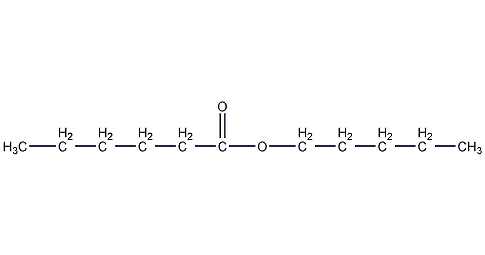
Structural formula
| Business number | 05JY |
|---|---|
| Molecular formula | C11H22O2 |
| Molecular weight | 186.29 |
| label |
n-Amyl n-hexanoate, n-Amyl hexanoate, Hexanoic acid amyl ester, Amyl hexanoate, artificial flavors |
Numbering system
CAS number:540-07-8
MDL number:MFCD00027281
EINECS number:208-732-4
RTECS number:MO8421700
BRN number:None
PubChem ID:None
Physical property data
1. Properties: colorless liquid.
2. Density (g/mL, 25/4℃): 0.8612
3. Relative density (20℃, 4℃): 0.867615
4. Melting point (ºC): -47
5. Boiling point (ºC, normal pressure): 226
6. Boiling point (ºC, 5.2kPa) : Undetermined
7. Refractive index (n/D25): 1.4202
8. Flash point (ºC): Undetermined
9. Specific rotation (º): Undetermined
10. Autoignition point or ignition temperature (ºC): Undetermined
11. Vapor pressure (kPa, 25ºC): Undetermined
12. Saturated vapor pressure (kPa, 60ºC): Undetermined
13. Heat of combustion (KJ/mol): Undetermined
14. Critical temperature (ºC): Undetermined
15. Critical pressure (KPa): Undetermined
16. Log value of oil-water (octanol/water) partition coefficient: Undetermined
17. Explosion upper limit (%, V/V): Undetermined
18. Explosion lower limit (%, V/V): Undetermined
19. Solubility: Soluble in ethanol , ether and acetone, insoluble in water.
Toxicological data
Acute toxicity: Rat oral LD50: >5gm/kg, no detailed instructions except lethal dose; rabbit dermal LD50: >5gm/kg, no detailed instructions except lethal dose.
Ecological data
This substance may be harmful to the environment, and special attention should be paid to water bodies.
Molecular structure data
1. Molar refractive index: 54.78
2. Molar volume (cm3/mol): 213.5
3. Isotonic specific volume (90.2K ): 494.5
4. Surface tension (dyne/cm): 28.7
5. Polarizability (10-24cm3): 21.71
Compute chemical data
1. Reference value for hydrophobic parameter calculation (XlogP): 3.8
2. Number of hydrogen bond donors: 0
3. Number of hydrogen bond acceptors:2
4. Number of rotatable chemical bonds: 9
5. Number of tautomers: none
6. Topological molecule polar surface area 26.3
7. Number of heavy atoms: 13
8. Surface charge: 0
9. Complexity: 121
10. Isotopic atoms Quantity: 0
11. Determine the number of atomic stereocenters: 0
12. Uncertain number of atomic stereocenters: 0
13. Determine the chemical bond position Number of stereocenters: 0
14. Number of uncertain chemical bond stereocenters: 0
15. Number of covalent bond units: 1
Properties and stability
Use and store according to specifications. It will not decompose and avoid contact with oxides.
Colorless liquid. It has the fruity aroma of ripe fruit, is mellow and sweet, but has a spicy taste, and is found in a variety of foods.
Storage method
This product should be sealed and stored in a cool, dry place.
Synthesis method
1. Use n-hexanoic acid and amyl alcohol to catalyze esterification in the presence of p-toluene sulfon and acid. During the reaction, benzene is added as a water entrainer to obtain it through azeotropic reflux dehydration and condensation.
2.Prepared by reacting n-hexanoic acid and pentanol in the presence of p-toluenesulfonic acid.
Purpose
1. Formulate fruity flavors such as pineapple, mango, banana and other fruity flavors to sweeten and modify the aroma of wine. It can also serve as an auxiliary solvent in the application of daily chemical fragrances.
2.Used in the formulation of edible and daily chemical fragrances. Used to prepare fruity flavors, such as pineapple, mango, banana and other fruity flavors.

 微信扫一扫打赏
微信扫一扫打赏

